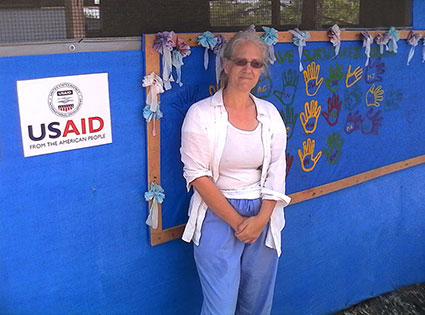
In December 2013, an Ebola outbreak began in Guinea, West Africa. Unlike previous outbreaks along the forests of the Congo Basin, Ebola did not burn out after a short time—instead, widespread and intense transmission persisted, spreading to three countries, with limited disease activity in at least six more.
“Once the opportunity arose to serve in the Ebola response, I took it,” says Elizabeth Glaser, MS GHPM’08, PhD’16. “I had been the moderator for the Ebola response community at Global Health Delivery Online, answering questions and facilitating discussion between health practitioners and researchers in 77 countries. My years as an HIV care nurse would be put to good use, and the presence of volunteers from prominent NGOs would likely bring much needed supplies and funding into the Ebola-afflicted countries of Guinea, Sierra Leone, and Liberia.”
During her time in the 25-bed unit, Glaser cared for about 30 men, women, and children with Ebola. “Despite the use of IV fluids and other interventions, the mortality rate ranged between 50 to 60 percent,” she says. “That’s a great improvement from the overall rate of 70 percent for the entire outbreak, but still unacceptable when we consider that mortality for Westerners at that time was a considerably lower 10 to 20 percent.”
After returning from Liberia, Glaser returned to the Heller School to complete her PhD dissertation, titled, “The impact of malaria on three aspects of human development: An exploration of methods and measures in a resource constrained setting.” She successfully defended her dissertation in 2016 and accepted a Visiting Faculty appointment at Global Health Service Partnership.
